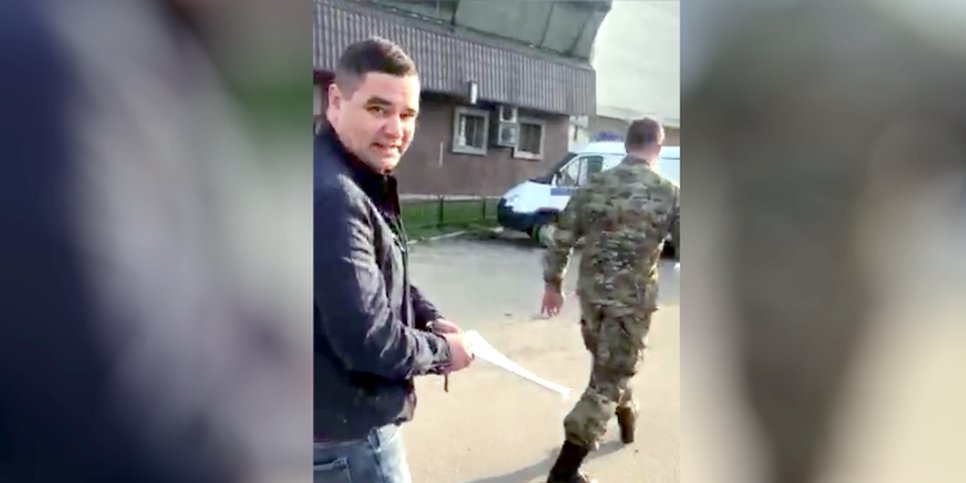Photo: Valery Shalev in handcuffs. Smolensk (April 2019)
Photo: Valery Shalev in handcuffs. Smolensk (April 2019)
In Smolensk, three men were sent to a pre-trial detention center for 2 months for their faith
Smolensk RegionOn April 26, 2019, the Leninskiy District Court of Smolensk sent three local believers to jail - 36-year-old Ruslan Korolev, 41-year-old Valery Shalev and 60-year-old Viktor Malkov. On the eve of Smolensk, mass searches were once again carried out in the homes of citizens whom local law enforcement officers suspect of professing the religion of Jehovah's Witnesses. A criminal case was opened under Part 2 of Article 282.2 of the Criminal Code of the Russian Federation. The case is being investigated by the Investigative Department of the FSB of Russia in the Smolensk region.
In total, on April 25, 2019, about three searches took place in Smolensk. For example, Valery Shalev was detained by law enforcement officers near his place of work. He was taken home, where a search was conducted for 2 hours. After the search, he was placed in the temporary detention center of the Department of Internal Affairs in the Smolensk district.
This is at least the second such criminal case. The first became known on October 7, 2018, when the FSB, together with the Center for Counteracting Extremism and SOBR, conducted searches in the homes of believers and arrested two women , Natalia Sorokina and Maria Troshina, who had been behind bars for more than six months. Now that the women have been placed under house arrest, a new case has been opened and three more people have been sent to pre-trial detention.
It is noteworthy that on December 18, 2016 in Smolensk , about 15 armed riot policemen, investigators and police officers entered the building for worship of Jehovah's Witnesses on Pushkin Street when a service was held there with the participation of about 60 believers. Law enforcement officers purposefully entered the toilet and pretended to find a brochure included in the list of extremist materials. By that time, evidence had already accumulated that law enforcement officers and persons cooperating with them systematically planted prohibited items on believers.
Law enforcers mistakenly mistake citizens' religion for participation in the activities of an extremist organization. Prominent public figures of Russia, the Human Rights Council under the President of the Russian Federation, the President of the Russian Federation, as well as international organizations - the foreign policy service of the European Union, observers of the Parliamentary Assembly of the Council of Europe, the Office of the UN High Commissioner for Human Rights - drew attention to this problem . Jehovah's Witnesses have nothing to do with extremism and insist on their complete innocence. The Russian government has repeatedly stated that the decisions of the Russian courts on the liquidation and prohibition of organizations of Jehovah's Witnesses "do not assess the doctrine of Jehovah's Witnesses, do not contain a restriction or prohibition to practice the above teachings individually."




